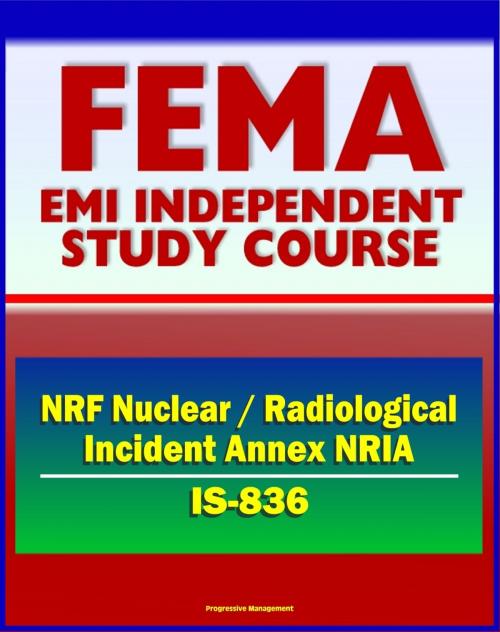21st Century FEMA Study Course: National Response Framework (NRF) Nuclear / Radiological Incident Annex NRIA (IS-836) - Nuclear Incident Response Team (NIRT)
Nonfiction, Science & Nature, Technology, Military Science, Social & Cultural Studies, Political Science| Author: | Progressive Management | ISBN: | 9781465977236 |
| Publisher: | Progressive Management | Publication: | July 16, 2011 |
| Imprint: | Smashwords Edition | Language: | English |
| Author: | Progressive Management |
| ISBN: | 9781465977236 |
| Publisher: | Progressive Management |
| Publication: | July 16, 2011 |
| Imprint: | Smashwords Edition |
| Language: | English |
This Federal Emergency Management Agency (FEMA) independent training course manual from the Emergency Management Institute (EMI) provides an introduction to the Nuclear/Radiological Incident Annex (NRIA) to the NRF.
The National Response Framework (NRF) presents the guiding principles that enable all response partners to prepare for and provide a unified national response to disasters and emergencies from the smallest incident to the largest catastrophe. As part of the NRF, the Incident Annexes describe the concept of operations to address specific contingency or hazard situations or an element of an incident requiring specialized application of the NRF. This course provides an introduction to the Nuclear/Radiological Incident Annex (NRIA) to the NRF.
Course Objectives
At the end of this course, students will be able to:
Describe the overall purpose of the NRIA and the policies that govern its use.
Describe the roles and responsibilities of agencies involved in the management of nuclear/radiological incidents.
Describe the types of incidents for which it would be activated and the concept of operations for a response.
This course is intended for government executives, private-sector and nongovernmental organization (NGO) leaders, and emergency management practitioners. This includes senior elected and appointed leaders, such as Federal department or agency heads, State Governors, mayors, tribal leaders, and city or county officials – those who have a responsibility to provide for effective response.
Topics covered include various incident types - commercial, federal, industrial, transportation, domestic nuclear weapons, foreign incidents, terrorism; Federal Radiological Monitoring and Assessment Center (FRMAC); and the Nuclear Incident Response Team (NIRT).
This is a privately authored news service and educational publication of Progressive Management.
This Federal Emergency Management Agency (FEMA) independent training course manual from the Emergency Management Institute (EMI) provides an introduction to the Nuclear/Radiological Incident Annex (NRIA) to the NRF.
The National Response Framework (NRF) presents the guiding principles that enable all response partners to prepare for and provide a unified national response to disasters and emergencies from the smallest incident to the largest catastrophe. As part of the NRF, the Incident Annexes describe the concept of operations to address specific contingency or hazard situations or an element of an incident requiring specialized application of the NRF. This course provides an introduction to the Nuclear/Radiological Incident Annex (NRIA) to the NRF.
Course Objectives
At the end of this course, students will be able to:
Describe the overall purpose of the NRIA and the policies that govern its use.
Describe the roles and responsibilities of agencies involved in the management of nuclear/radiological incidents.
Describe the types of incidents for which it would be activated and the concept of operations for a response.
This course is intended for government executives, private-sector and nongovernmental organization (NGO) leaders, and emergency management practitioners. This includes senior elected and appointed leaders, such as Federal department or agency heads, State Governors, mayors, tribal leaders, and city or county officials – those who have a responsibility to provide for effective response.
Topics covered include various incident types - commercial, federal, industrial, transportation, domestic nuclear weapons, foreign incidents, terrorism; Federal Radiological Monitoring and Assessment Center (FRMAC); and the Nuclear Incident Response Team (NIRT).
This is a privately authored news service and educational publication of Progressive Management.















